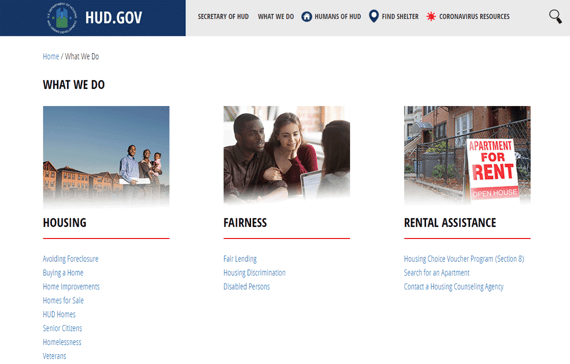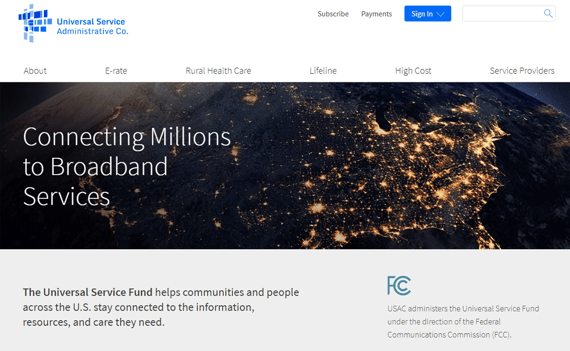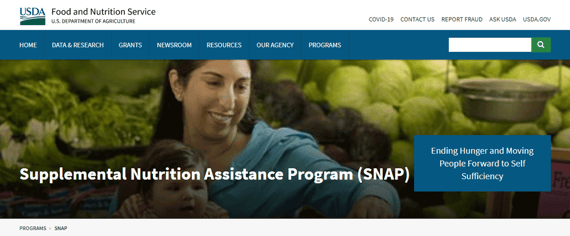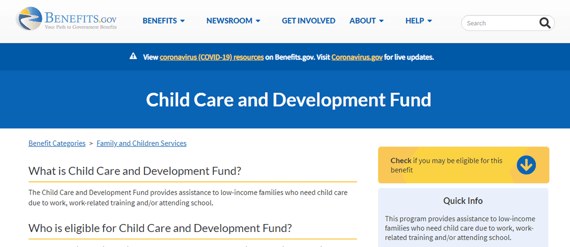

Whether the U.S. is facing down a recession or a depression, one thing is certain: The economy is currently in a bad place, and the downturn is having a serious impact on millions of peoples’ lives.
Many Americans are still not back at work and earning as usual, and may not be for quite some time. If you‘re in this position and have children depending on you for support, do not hesitate to reach out for help.
Here are 9 excellent resources for families in a financially tough spot.
1. Housing and Urban Development
(800) 569-4287
Housing and Urban Development is a federally run program that exists to provide low-income families with “decent, safe, and affordable housing.” It can connect you with everything from a rental subsidy and vouchers for immediate housing needs to identifying space in public housing for longer-term assistance.
While the process can be slow and the paperwork is laborious, the fact is, HUD can help you with one of your most critical expenses — shelter.

HUD.gov is an online government resource that helps families find safe and affordable housing.
Qualifications: Rental assistance and public housing are limited to low-income families and individuals, and eligibility is based on several factors, including annual gross income, age, and whether you have a disability. The local Housing Authority will also check references to make sure your family will be appropriate tenants.
2. United Way
Phone numbers vary by location
You may not need something as extreme as what HUD offers, but may still need help paying your monthly rent or obtaining money to secure a new rental unit. In that case, United Way is a go-to resource.
This organization is a connector to a wide range of nonprofits, charities, and government organizations in your area that can help with housing. It can also link you to programs that conduct rapid rehousing, so you don’t become homeless as you move from one place to another.
Qualifications: Anyone can call United Way’s 211 number to see what is available based on their unique circumstances. The assistance you qualify for will depend on your income.
3. Universal Service Administrative Company
(800) 234-9473
A reliable method of communication is essential, but if you can’t afford to pay your phone bill — much less buy a phone — The Universal Service Fund can help. Formed in partnership with the Federal Communications Commission, this program helps low-income individuals and families obtain discounted landline and cellphone service, as well as a free cellphone.

The Universal Service Fund helps low-income families obtain discounted landline and cellphone service.
Qualifications: You’re eligible for the program if your income falls below federal poverty guidelines, you participate in a variety of federal welfare programs, live on tribal land and qualify for certain tribal programs, or receive a federal veterans pension.
4. Low Income Home Energy Assistance Program
acf.hhs.gov/ocs/programs/liheap
(202) 401-9351
If you are unemployed or underemployed and are having trouble keeping the power on because money is tight, contact the Low-Income Home Energy Assistance Program (LIHEAP). It provides federally funded assistance to people who need help managing their home energy bills.
It can also provide you with weatherization, which is the process of protecting your home against energy loss, and even pay for some energy-related home repairs.
Qualifications: Requirements vary by where you live. In general, your gross annual household income must fall below the maximum income level for your state and household size, though you can add $6,240 per family member if there are more than eight in your household.
5. Supplemental Nutrition Assistance Program
https://www.fns.usda.gov/snap/supplemental-nutrition-assistance-program
(800) 221-5689
Formally known as food stamps, the Supplemental Nutrition Assistance Program (SNAP) is for people who need assistance feeding their families. It provides you with a benefits card that works like a debit card. You can use it to purchase food at supermarkets, grocery stores, and farmers’ markets.
Although SNAP benefits are unlikely to cover your entire grocery bill (hence the word “supplemental”) every dollar you receive can help relieve pressure at the checkout counter.

The U.S. Department of Agriculture provides SNAP benefits to food-insecure families and individuals.
Qualifications: To be eligible for SNAP, you’ll have to meet three requirements. 1. Your gross monthly income must be at or below 130% of the poverty line. 2. Your net income must be at or below the poverty line. 3. Your household without an elderly or disabled family member must have assets of $2,250 or less. A household with such a family member must have assets of $3,500 or less.
6. Women, Infants and Children
Phone numbers vary by location
If you are pregnant, a nursing mother, and/or have children younger than the age of 6, the Special Supplemental Food Program for Women, Infants, and Children (otherwise known as WIC) may be available to you. As long as you qualify, you’re entitled to certain foods at no cost to you.
Items include infant formula and cereal, baby foods, iron-fortified adult cereal, fruits and vegetables, eggs, milk, cheese, yogurt, tofu, peanut butter, beans, peas, canned fish, and whole wheat bread.
Qualifications: Each state can set its own qualification standards, though most fall back on the federal standard: Your gross income must be below 185% of the U.S. Poverty Income Guidelines. For example, in California, a family of five with an annual income of $56,758 or less would qualify.
7. Child Care and Development Fund
https://www.benefits.gov/benefit/615
Phone numbers vary by location
One of the biggest expenses for parents is childcare. It can eat up most of your paycheck or unemployment insurance benefits. The Child Care and Development Fund can help.
It provides financial assistance to low-income families who have trouble covering the cost of essential childcare while they are at work, attending work-related training, and/or attending school.

The Child Care and Development Fund helps families cover the cost of childcare services.
Qualifications: Your children must be under the age of 13, though they can be up to 19 if, for example, they are incapable of caring for themselves due to a disability. Your income should be “low or very low” and you must be either employed or enrolled in a training or education program.
8. National Foundation for Credit Counseling
(800) 388-2227
If you’re struggling to pay consumer debts such as credit card bills, personal loans, or other collection accounts, contact the National Foundation for Credit Counseling to be connected to a member agency. The staff there will help you manage your family’s finances so you can ensure your money is directed to the most essential expenses first.
There is no charge for credit counseling. And the agency will give you critical information about student loans, tax debt, and secured loans, including mortgages and vehicles, as well as provide you with basic legal information about your rights and responsibilities as a borrower.
Qualifications: Anyone, no matter what their financial circumstances may be, can take advantage of the NFCC’s free budget and debt counseling sessions.
9. National Alliance on Mental Illness
(800) 950-6264
The stress of not having enough money for mental health care can be overwhelming. Sessions with a private therapist can easily be over $100 an hour, and they’re often not covered by health insurance.
Don’t let a lack of funds prevent you from getting the services you and your family require. Contact the National Alliance on Mental Illness (NAMI), which provides peer-support services, information, and resource referrals at no charge to you. NAMI Family Support Groups are free and meet weekly, every other week, or monthly, depending on location.

The National Alliance on Mental Illness provides free resources to anyone in need of mental health support.
Qualifications: There are no income restrictions to participate or obtain information from NAMI.
Visit Local Websites for More Resources
The organizations and agencies included here only scratch the surface of the help that exists for financially strapped families. Much more is available on a local level, so visit your state and city’s official websites for services and programs available to families in your area.
Advertiser Disclosure
BadCredit.org is a free online resource that offers valuable content and comparison services to users. To keep this resource 100% free for users, we receive advertising compensation from the financial products listed on this page. Along with key review factors, this compensation may impact how and where products appear on the page (including, for example, the order in which they appear). BadCredit.org does not include listings for all financial products.
Our Editorial Review Policy
Our site is committed to publishing independent, accurate content guided by strict editorial guidelines. Before articles and reviews are published on our site, they undergo a thorough review process performed by a team of independent editors and subject-matter experts to ensure the content’s accuracy, timeliness, and impartiality. Our editorial team is separate and independent of our site’s advertisers, and the opinions they express on our site are their own. To read more about our team members and their editorial backgrounds, please visit our site’s About page.




